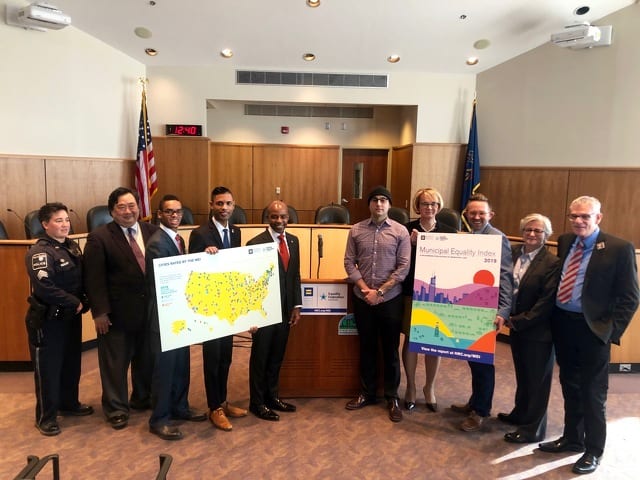State College for the first time has received a perfect score in the nationwide Municipal Equality Index, an annual assessment produced by the Human Rights Campaign that evaluates inclusiveness for lesbian, gay, bisexual, transgender and queer protections in municipal laws, policies and services.
The HRC, which is the nation’s largest LGBTQ civil rights organization, announced its 2019 MEI at an event Tuesday in the State College Municipal Building, where campaign leadership was joined by State College Mayor Don Hahn and local community members.
HRC President Alphonso David said that as efforts are made at the federal level to strip anti-discrimination protections, work at the local level to protect LGBTQ people is critical.
‘As we fight back against blatant homophobia, transphobia and bigotry we are also working at the state and local levels to make sure LGBTQ people have the protections that they need,’ David said. ‘Fortunately many local officials in cities and municipalities all across the United States, including right here in State College, Pennsylvania, are advancing inclusive policies that are welcoming to all.’
The MEI rates participating municipalities on a variety of issues including non-discrimination laws, municipal employment policies, inclusiveness of city services, law enforcement and leadership on LGBTQ issues, including public positions, equality legislation and elected and appointed LGBTQ leaders.
This year, 508 municipalities nationwide participated in the assessment, with 88 receiving perfect scores. In Pennsylvania, Allentown, Philadelphia and Pittsburgh joined State College in scoring 100 out of a possible 100 points.
‘This year the Municipal Equality Index lays out in vivid detail municipalities that are stepping up for fairness and equality by protecting LGBTQ residents and visitors,’ David said, noting a 30 percent increase since last year in municipalities with non-discrimination laws that include sexual orientation and/or gender identity. ‘From coast to coast and in every corner of this country this index is creating real change for people and incentivizing localities to move closer to full equality.’
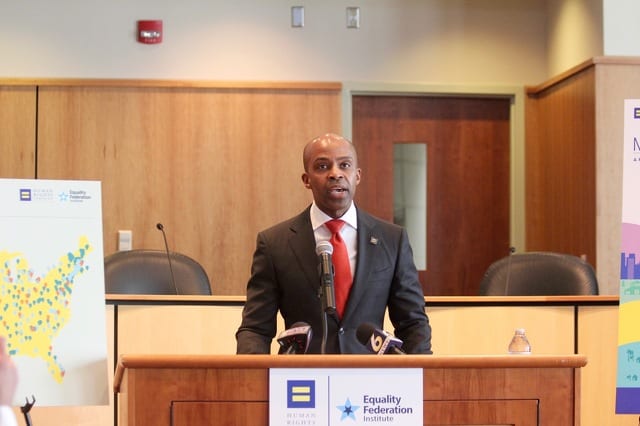
Human Rights Campaign President Alphonso David. Photo by Geoff Rushton/StateCollege.com
State College’s score of 100 is up from 98 last year and 77 in 2017, which is the same year the borough’s LGBTQ Advisory Committee was established. Borja Gutierrez, who helped coordinate the creation of the committee and now serves as its vice chair, said over the past two years a number of initiatives have taken root, which in turn have bolstered the borough’s MEI score.
Those have included borough council’s ban on conversion therapy for minors, an all-inclusive workplace policy, ensuring domestic partners receive work and health benefits, establishing an LGBTQ liaison position, and the addition of gender-neutral bathrooms in the municipal building and public parking garages.
‘Even though the LGBTQ advisory board has accomplished a lot recently, all of which has led to our current score, we remain committed to doing all we can now and in the future to ensure the inclusive and equitable participation and treatment of LGBTQ people in all facets of their lives in the borough,’ Gutierrez said.
Gutierrez added that for the first time, the borough placed Pride banners throughout downtown and displayed a Pride Month flag in conjunction with Penn State’s Pride Month activities in April, ‘an example of how campus and community were able to collaborate to enhance the quality of life for LGBTQ community members and visitors.’
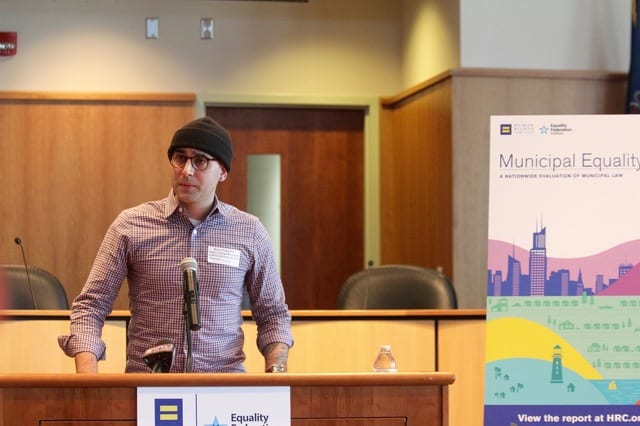
Borja Gutierrez, vice-chair of the State College LGBTQ Advisory Committee. Photo by Geoff Rushton/StateCollege.com
For Freddy Purnell, inclusion on campus and in town has been vital. The president of Penn State’s LGBTQ Student Roundtable, Purnell said when as a high school student in West Philadelphia he was considering colleges, he was unsure about Penn State, its location in central Pennsylvania and whether he would find the acceptance and community he did at home.
‘When I got here I noticed how accepting the community was on campus and off campus and how there were resources available, such as the Center for Sexual and Gender Diversity on campus and places downtown that also made sure promoting equality and supporting queer people was at the forefront of their objectives,’ Purnell said.
Purnell also said borough leaders have been active in engaging with the LGBTQ community on and off campus and that if issues arise community members feel they have somewhere to turn.
‘Specifically the borough council, no matter what issues we have faced on campus, they have always been willing to work with us,’ Purnell said. ‘Just seeing the mayor, seeing council members not only coming to our events but also actively engaging with our students… willing to hear what we need, making sure that we are heard and our opinions and the problems we face are being addressed in the borough — that is extremely important to me.’
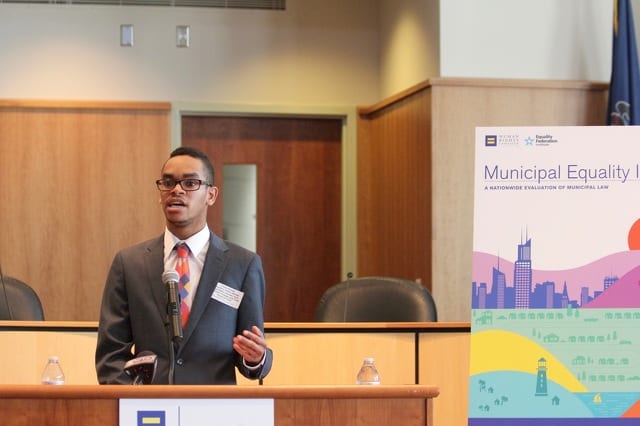
Freddy Purnell, 2019 president of the Penn State LGBTQ Student Roundtable. Photo by Geoff Rushton/StateCollege.com
Claire Thomas, founder and president of the State College-based equality nonprofit The 100% Sign, also spoke of the collaborative spirit of the community in fostering LGBTQ inclusivity. She cited the borough’s ordinances on employment discrimination, fair housing and public accommodations, as well as the conversion therapy ban; local businesses like Webster’s Bookstore Cafe and its owner Elaine Meder-Wilgus, who regularly provides welcoming spaces for LGBTQ events; and nonprofit organizations like Centre LGBTQA Support Network, which provides support groups, events, resources and education.
‘Are we perfect in all things yet? I think the answer to this must be no, and I think the borough understands and knows this,’ Thomas said. ‘…We should not rest comfortable on our laurels. Nonetheless, achieving a perfect score this year on the Human Rights Campaign Municipal Equality Index is a wonderful achievement.’
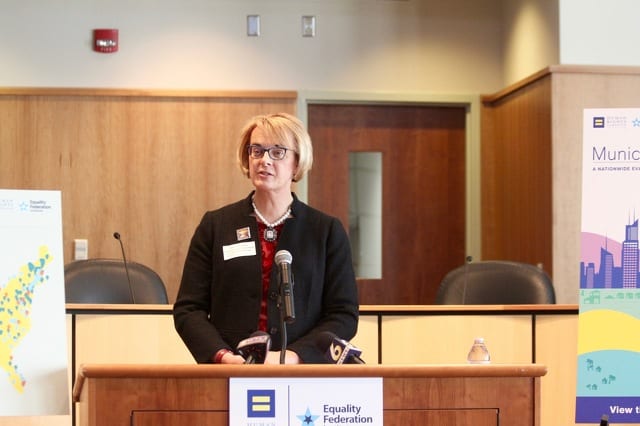
Claire Thomas, founder of State College-based nonprofit The 100 Percent Sign. Photo by Geoff Rushton/StateCollege.com
State College Borough Councilman Dan Murphy said after the press conference that the HRC recognition is ‘incredible’ and important for the community.
‘I think it says a lot for a community to not just do the work that is necessary but also to take the moments to celebrate and affirm the people who call State College home, especially those who look around at the world around them and see things that cause concern,’ Murphy said. ‘To have the place you call home be recognized for protecting some of those core things that help make people feel safe is critically important.’
Murphy, the first openly gay member of borough council, said like Purnell, when he first moved to State College he felt he would probably make ‘some tradeoffs’ in his personal life and was uncertain about whether he’d find a community.
‘I think in the first couple of years I felt that but over the last couple of years I’ve started to find more community here,’ he said. ‘As we do more to celebrate the LGBTQ community, I think we also find community members more actively engaged in their community. People who might have historically gone to places like Pittsburgh or Philadelphia to get some of the things they were looking for in terms of community are finding more opportunity to do so here.
‘The same goes for me. I’m finding more opportunity to be myself, to live my full life, to feel more comfortable in the community. Some of the efforts that were celebrated here today speak to some of what’s made that possible, but I also just think more people coming here living out and living open has also created more opportunity for that as well.’
While he is proud of the borough’s achievements, there is more that can be done, Murphy said. One thing is to evaluate Pride events and how they are celebrated.
‘Being located where we are in central Pennsylvania there are opportunities for us to be a leader, not just for our own community but for communities around us who have young LGBTQ people who are looking for places to feel affirmed and to feel celebrated,’ he said.
Another is to continue to have a focus on inclusivity in borough policies in ordinances. That includes State College’s zoning rewrite and a consideration of what single-family residential zoning means.
‘As we look at our zoning rewrite, the community has a history of really being focused on single-family residential, which I understand for a whole host of reasons has been a priority for the community,’ he said. ‘But single-family residential zoning also kind of suggests and communicates a value on who you want in your neighborhood in terms of it’s built around a nuclear family structure that doesn’t account for extended family or family of choice. I think those are things that as a member of the community I’m looking at when I look at communities where I want to live and setup roots.’
David said that across the nation, while progress has been made, more is needed. For example, LGBTQ communities of color face a health crisis, with one out of two gay or bisexual black men projected to contract HIV in their lifetime, he said, and more than half of black transgender women living with HIV, a problem compounded by the violence they also face.
Communities can help address this, he said, by making safe, effective prevention tools such as PrEP, or pre-exposure prophylaxis, a pill used daily to prevent HIV infection, accessible to individuals at high risk.
‘All of the statutes regulations, ordinances, policies and services that are evaluated in the MEI are real tools for change that affect the daily lives of LGBTQ people,’ David said. ‘We are very proud of the progress we have made over the years, but we need to continue to push for greater and more inclusive policies across this country.’
Hahn, meanwhile, said his experience with HRC goes back to the 1980s when he worked as a Penn State student on the congressional campaign of Bill Wachob, whose progressive platform was supported by the HRC.
‘With spectacular advances marriage equality, anti-discrimination and hate crime legislation and HIV/AIDS advocacy we’ve come a long way but we have so much further to go,’ Hahn said.
He added that he commends everyone in the community that has helped make State College an inclusive place.
‘As mayor, I’m proud of everyone in State College who made possible our perfect score on the Municipal Equality Index: engagement manager Kevin Kassab, [community engagement specialist] Autumn Busbee, the LGBTQ advisory committee, borough manager Tom Fountaine, mayors and State College Borough Council members both past and present, some I see here, especially mayor emerita Elizabeth Goreham, and last but not least the people of State College.
‘The borough may not always get everything right, but the people of State College have always stood for progress. When we get things wrong, they have not hesitated to demand that we get things right, that we correct things. And if we have not, they have replaced us with people who get things right more often.’
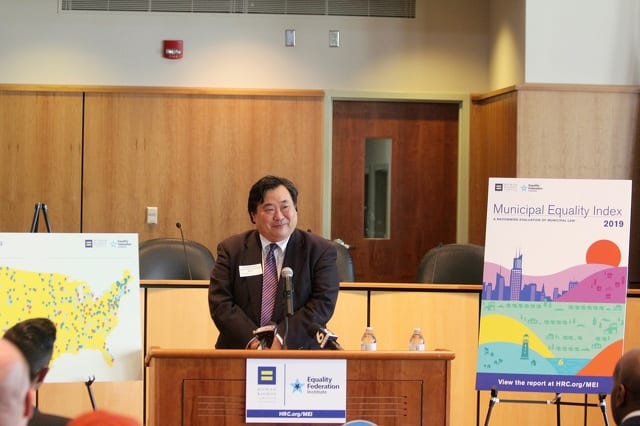
State College Mayor Don Hahn. Photo by Geoff Rushton/StateCollege.com
